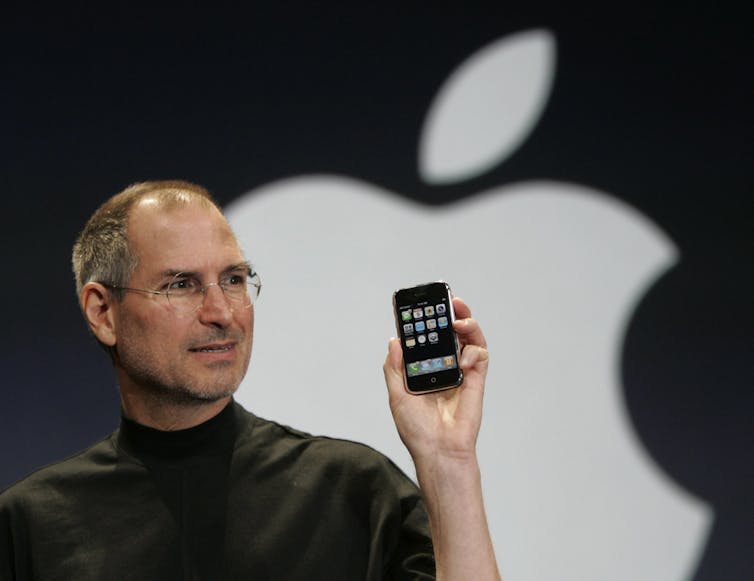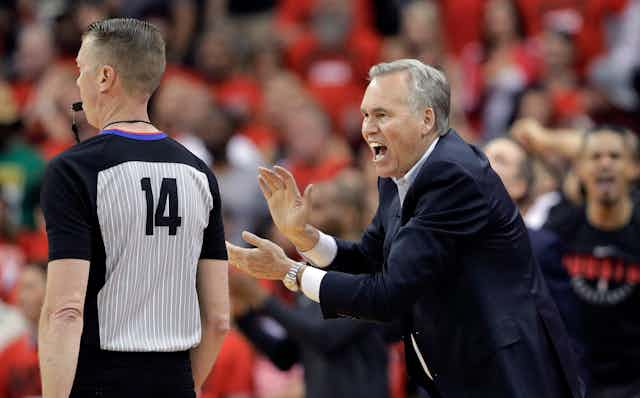“Defiant Rockets rewarded for ignoring calls for change.” That was one of the top headlines on ESPN following the recovery by the Houston Rockets in Game 2 of the NBA Western Conference finals. Despite a barrage of criticism directed at the team’s offensive strategy after a lopsided loss in Game 1, the Rockets stayed the course. And it paid off.
After a tough 119-106 loss to the Golden State Warriors two nights before, Houston coach Mike D’Antoni could have gone back to the drawing board and changed the offensive game plan. After all, that is what critics expected he would do to put the team in a more competitive position in Game 2.
But D’Antoni, like many basketball coaches, knows that sometimes the best move is no move at all.
D’Antoni’s decision not to change the isolation-heavy offence that led his team to the top of the Western Conference during the regular season is what I call “competitive forbearance,” a purposeful decision not to act when key decision-makers have opportunity and capability to do so.
Competitive forbearance is also an important strategic decision in the business world.
Competitive forbearance in business
Competitive dynamics, a stream of strategic management research, addresses fundamental questions in strategy: How firms behave and why firms perform differently.
Studies in this area have mainly focused on how competitive aggressiveness — the propensity to carry out a large number of competitive actions — increases a firm’s performance. Firms that fail to act frequently appear unenterprising or “passive,” which can diminish performance.
Little attention has been paid to the possible benefits of purposeful decisions not to act.
Mutual forbearance theory suggests multimarket rivals choose competitive forbearance to prevent unnecessary losses associated with escalating rivalry across several markets.
Read more: Hoping for a bullish stock market? Cheer for the Washington Capitals
However, multimarket contact is just one situation in which forbearance is preferable to action. Savvy firms use forbearance to outmanoeuvre rivals in a variety of competitive situations.
For example, Apple decided not to integrate Adobe’s Flash Player into the iPhone and the iPad. As a result, Adobe withdrew its Flash Player from the Android mobile operating system of Apple’s arch enemy, Google, and chose to refocus its efforts around the emerging HTML5 standard. This suggests that Apple’s forbearance was the right choice despite being heavily criticized at the time.

I was part of a research project that explored the antecedents and consequences of competitive forbearance in the basketball coaching setting. Our research findings show that it has a significant impact on competitive rivalry.
How forbearance improves performance
In basketball, coaches make a wide range of forbearance decisions — not replacing players who are in foul trouble, not calling timeouts when teams are underperforming and not responding to opponents’ changes in offensive or defensive strategies.
In fact, 30 post-game interviews with nine coaches regarding their strategic decisions in 15 basketball games in the division one men’s basketball league of the FIBA–Europe revealed 673 competitive acts and 143 competitive forbearances. In other words, 17 per cent of all considered competitive moves were purposefully not executed. Competitive forbearance varied systematically across coaches.
The reasons basketball coaches choose to forbear can vary, from waiting for the full benefits of previous decisions to materialize to increasing players’ confidence — or in the case of D’Antoni, avoiding moves inconsistent with the team’s existing strategy and providing an opportunity for players to learn from experience. It was the right call — the Rockets went on to win 127-105 in Game 2.
Although competitive forbearance can improve team performance by expanding the range of strategic maneuvers and by making competitive behaviours less predictable, coaches are more prone to act than to forbear. Why is that? Two key factors are stakeholder pressure and coaching confidence.
Not acting attracts criticism
Owners, journalists, analysts, fans and players often assume that not taking action indicates incompetence and a lack of coaching skills. Thus, the norm is to act and forbearance is a violation of the norm.
The negative outcomes associated with forbearance are judged more harshly than the negative outcomes of actions. The effects of this pressure are especially evident in the last two minutes of the game, where our study revealed competitive forbearance was 62 per cent less likely to occur.
Not all coaches succumb to stakeholder pressure. More accomplished coaches had 42 per cent higher odds of forbearing. We also found the coaches who were confident about winning the game were over two and half times more likely to forbear. D’Antoni’s regular-season record with the Rockets — 65 wins in 82 games — would indicate a certain amount of confidence in the team’s odds of success.
When key decision-makers actively use forbearance, they consider a wide range of plots to outcompete rivals. They are also less predictable to rivals because they forbear when rivals expect action.
Despite its unique advantages, competitive forbearance is not in the toolkit of many basketball coaches. Only more accomplished and confident coaches are more likely to use competitive forbearance, which in turn, increases team performance.
And how did it work out for the Houston Rockets? D’Antoni kept firm to his forbearance decision throughout the Western final — he did not change the team’s offensive strategy. But a collapse in the second half of Game 7 led to a Golden State victory. If the Rockets did not lose Chris Paul when they were up 3-2 after five games, they might have been in the finals.
Indeed, it is not one decision, but a series of decisions that can increase or decrease performance. Forbearances increased the chances of success, but it is a combination of actions and forbearances that is critical for winning.

